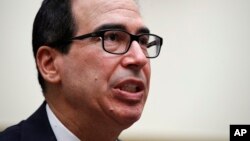The United States is not granting “blanket waivers” to requests from European allies that are seeking exemptions from U.S. sanctions imposed on countries doing business in Iran. But senior officials said Washington would consider waivers on a “case-by-case” basis.
“There are no blanket waivers, there's no grandfathering. We will consider situations on a case-by-case basis,” U.S. Treasury Secretary Steven Mnuchin told reporters Friday, remarks that were embargoed for release on Monday.
“We want people to reduce oil purchases to zero, but in certain cases, if people can't do that overnight, we'll consider exceptions,” said Mnuchin, amid U.S. efforts to avoid a disruption of global oil markets as Washington is reimposing sanctions against Tehran.
He added, “We have told our counterparts that we expect them to enforce the sanctions, but if there are specific situations, we're open to listening.”
Mnuchin’s remarks came days before the G-20 finance ministers’ meeting in Buenos Aires, where Britain, France, Germany and other European allies will attend. China, India, Korea, and Japan, traditionally big buyers of Iranian oil, are also among the G-20 members in attendance.
When asked by VOA if Washington received any assurances from Asian nations to reduce oil imports from Iran, U.S. Secretary of State Mike Pompeo said Friday he “personally” had conversations with most of those countries and “they have a commitment, they understand where we're headed, what we're trying to achieve.”
“What they've asked us to do is review how we get there and the timeline for that [cut Iran oil exports to zero],” Pompeo noted in remarks embargoed for release Monday.
Pompeo emphasized the goal is to deny Iran revenue that would be used to continue to “foment terror and malign activity” around the world.
U.S. President Donald Trump’s administration has been lobbying Asian consumers of Iran oil to end crude purchases from Tehran.
Meanwhile, U.S. officials have been in meetings with Saudi officials to maintain a well-supplied oil market to guard against market volatility.
The State Department can issue waivers around significant reductions in the oil markets. Officials said both the U.S. Treasury Department and State Department will work together on the case-by-case consideration of waivers.
The United States pulled out of the Iran nuclear deal earlier this year.The deal sought to limit Iran's nuclear activity in exchange for sanctions relief.
The U.S. said it plans to reimpose tough sanctions on Iran, beginning in early August, targeting Iran's automotive sector, trade and gold, and other key metals.
A second set of sanctions are set to begin in early November.Those sanctions will focus on Iran's energy sector and petroleum-related transactions, and transactions with the central bank of Iran.
The U.S. has warned other countries that they will also face sanctions if they continue to trade with sanctioned sectors of the Iranian economy.




